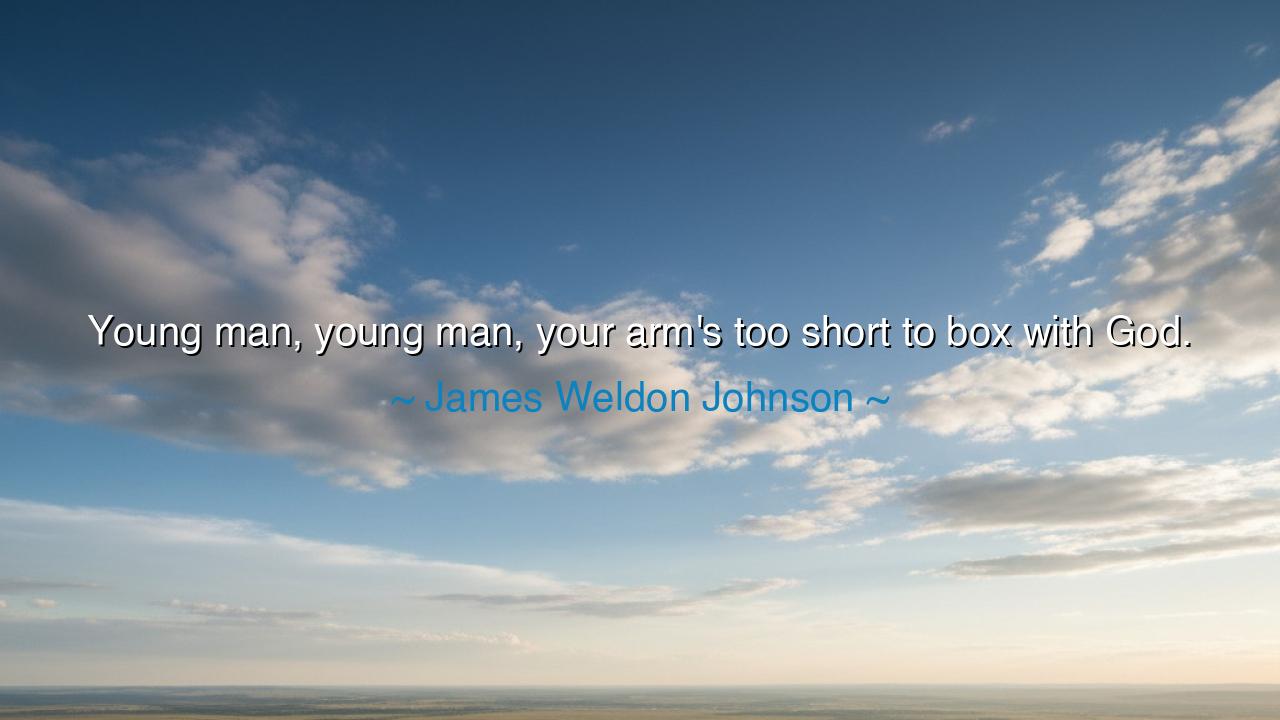
Young man, young man, your arm's too short to box with God.






Listen, O children of wisdom, to the words of James Weldon Johnson, spoken with a tone of warning and deep understanding: "Young man, young man, your arm's too short to box with God." This bold statement carries within it a truth that has echoed through the ages—the notion that no matter how strong or determined we may be, there are forces far greater than us, and to challenge them is a futile endeavor. God is beyond human comprehension, beyond our strength, and to think that we can stand against Him or defy His will is to underestimate His power and the immensity of His wisdom.
In the ancient texts, the relationship between humanity and the divine was often framed by humility and respect for the forces beyond human control. The Greek philosophers, especially Socrates, spoke of the moral obligation to recognize the limits of our knowledge and power. They believed that true wisdom lay in understanding that there are forces greater than ourselves—fate, divine will, or the gods, as they were known in those times. To attempt to box with God was to enter into a battle we could never win, for the divine will is unmovable and all-encompassing. The Greek myth of Prometheus, who defied Zeus to bring fire to humanity, serves as a poignant reminder: his great defiance of divine authority led to suffering and punishment. God, or the gods, are not to be trifled with, for their will is beyond the reach of human power.
Johnson's words resonate deeply in this context—the “young man” represents youth’s bravado, the belief that through sheer will and determination, we can shape the world around us according to our desires. But Johnson, like the ancient sages, reminds us that there are forces far greater than our own will, and when we try to oppose them, we only bring upon ourselves suffering. The young man, full of energy and ambition, believes that he can wrestle with God, but his arm is simply too short. No matter how much we may strive, we cannot escape the divine order, for it is eternal and unyielding.
Consider, O children, the story of Job, a righteous man who suffered terribly, losing everything—his family, his wealth, his health. In his pain, he questioned God, demanding to know why such suffering was allowed. But in the end, God answered Job out of the storm, declaring, “Where were you when I laid the earth’s foundation?” (Job 38:4). God reminded Job of his finite understanding and the limits of human wisdom. Job's challenge to the divine order was met with the revelation that the mysteries of life and suffering are beyond human comprehension, and that God’s will and wisdom are far greater than anything man can fathom. Job, like the young man in Johnson’s quote, learned that his arm was too short to box with God—there are mysteries in life that are not for us to understand, but for us to trust.
This truth is further illustrated in the life of Napoleon Bonaparte, who, though he rose to become one of the most powerful leaders in history, ultimately fell at the hands of forces beyond his control. In his ambition, he thought he could reshape Europe, challenge the established order, and even conquer Russia. Yet, in the Russian winter and the treacherous conditions of war, Napoleon was humbled. His defeat was not by the hands of men alone, but by the forces of nature, fate, and divine will. He learned, as many others before him have, that no matter how mighty a ruler may be, the divine laws that govern the universe cannot be defied. The attempt to "box with God" resulted in his eventual exile, a testament to the humbling power of divine will over human pride.
The lesson here, O children of wisdom, is one of humility and recognition of our limits. We are not meant to challenge the divine order or believe that our will alone can shape the universe. We are called to recognize our place in the grand design, to live in harmony with the forces greater than ourselves, and to trust in the divine wisdom that surpasses our understanding. When we accept our limitations, we open ourselves to the possibility of true peace and growth. God’s will is unshakable, and it is only in submission to that will that we find our true strength.
What, then, must we do with this wisdom? We must learn to walk humbly, knowing that we cannot control all things, nor should we seek to. Let us trust in the divine guidance that leads us, even when the path is unclear, and recognize that sometimes the greatest wisdom lies in surrender, not in defiance. When we seek to understand God’s will, when we live in alignment with divine order, we discover that our struggles become less about resistance and more about trust. God’s wisdom is far greater than our own, and in that understanding, we find peace, even in the face of life’s greatest challenges.
So, O children of wisdom, remember that your arm is too short to box with God. Walk in humility, seek to understand the greater forces at work in your life, and align yourself with the divine will. In doing so, you will find that peace and understanding come not from trying to control the world, but from trusting in the higher purpose that governs it. Live in harmony with the divine, and you will discover that true strength lies in surrender to the divine wisdom that guides all things.






AAdministratorAdministrator
Welcome, honored guests. Please leave a comment, we will respond soon